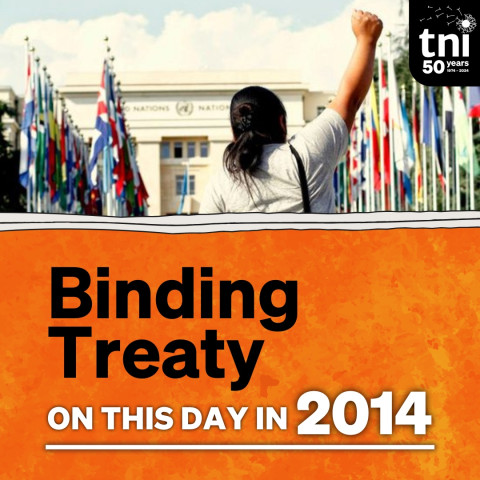The Binding Treaty and the Fight for Corporate Accountability On this day in 2014
On this day in 2014, movements from all over the world celebrated an unprecedented achievement, a historic step to put an end to corporate impunity: the establishment of the so-called Binding Treaty process.

The United Nations Human Rights Council adopted Resolution 26/9, establishing a working group to draft an international legally binding instrument to regulate, in human rights law, the activities of Transnational Corporations (TNCs). Movements at the forefront of the struggle against corporate crimes pushed for this process because of the power asymmetry between transnational corporations, States and peoples.
Business interests and foreign investments are protected under international law. Intellectual property rights, free trade and investment protection agreements are binding norms with strong sanctioning mechanisms. Private investors can sue states at private international tribunals if new laws that protect the environment or workers rights. negatively impact on their future profits.
Meanwhile, violations of human and environmental rights have become just another part of transnational corporations’ operations. There are no binding rules in international human rights law that can hold corporations accountable for their crimes, just toothless voluntary principles".
Just think about that for a moment: Huge businesses have layers of protection under international law, while the people who live with the consequences of their crimes often have few options to access justice. 69 out of the richest 100 economic entities in the world are corporations, not States, but there is still no single instrument to regulate these very complex structures controlling diffuse, opaque, and truly global value chains.
The Global Campaign to Reclaim People’s Sovereignty, Dismantle Corporate Power and Stop Impunity, of which TNI is a founding member and co-facilitator, is one of five coalitions of movements, unions, affected communities, and civil society organisations in support of a strong and effective Binding Treaty. From the outset of the process, the Global Campaign has organized a Week of Mobilisations to follow, influence, and mobilize around the negotiations in Geneva, within and outside the United Nations building.
States will meet in October 2024, in Geneva, for the 10th session of the Open Ended Inter-Governmental Working Group (OEIGWG) to negotiate the latest Updated Draft of this future Binding Treaty. Led by Global South States, ten years later, negotiations are hotter than ever, despite fierce opposition from transnational corporations’ representatives and governments of the Global North.
The Binding Treaty has been a game changer, touching the very structures of a system that puts profits above people and the planet. To regulate TNCs within a human rights framework, centering the demands of those most affected by their violations, is to decisively state that we, the people, choose life over greed and will continue fighting hasta la victoria.